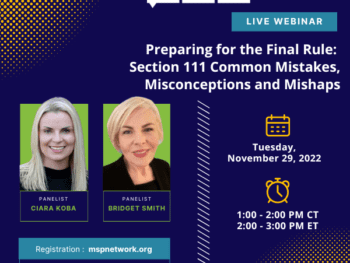
As the Medicare Set-Aside industry has grown and matured in workers’ compensation, a similar approach is now being considered with liability settlements. The law on the books for decades clearly says that Medicare is supposed to be a secondary payer in such settlements. Lately, there have been clear indications the Centers for Medicare and Medicaid Services (CMS) plans to take action on this soon. How it will ultimately shake out is up for debate. In the meantime, payers should at least be aware of what is happening and take steps to prepare.
Click Link to Access Free PDF Download
“8 ‘Think Outside the Box’ Tactics to Settle Workers’ Comp Claims”
The Issue
“The extent to which settling parties must consider Medicare’s interests in medicals in a liability settlement continues to be unclear.” Thus begins a new white paper discussing the issue and what can be done. Written and published by Tower MSA Partners, Navigating Through the Fog: Medicare, Future Medicals & Liability Settlements reviews the workers’ compensation experience with CMS, outlines likely scenarios for liability settlements, and provides tips for payers.
Liability insurance coverage protects the policyholder or self-insured entity against claims based on negligence, inappropriate action, or inaction that results in bodily injury or property damage.
Examples include
- Homeowners’ liability insurance
- Automobile liability insurance
- Product liability insurance
- Malpractice liability insurance
- Uninsured motorist liability insurance
- Underinsured motorist liability insurance
Medicare beneficiaries must notify Medicare when a liability claim is made against a party with liability insurance and the liability carrier must report to Medicare when it settles a claim with a Medicare beneficiary. When there is a settlement, Medicare expects reimbursement for any payments it covered that should have been paid out of the settlement.
The settlement becomes more complicated when there are future medical costs for the specific injury. If Medicare is billed, it may seek reimbursement. In those situations, Medicare’s interests should be taken into account, and a liability MSA may be advisable.
Medicare Has Not Yet Established Framework for Liability MSAs
Unlike the process for workers’ compensation MSAs, Medicare has not established a framework for reviewing LMSAs or provided any guidance on the issue. Instead, any CMS reviews for proposed LMSAs that do occur are done on a case-by-case basis and only by some regional offices.
The good news is that, so far at least, there are no known incidents of CMS denying payment or seeking reimbursement for injury-related medical care after a liability settlement. Tower MSA Partners anticipates action from CMS within the next two years. When that happens, according to the white paper, CMS will need to address issues including:
- Review thresholds
- Allocation of the MSA based upon a compromise formula
- Documentation required to submit to CMS with an LMSA proposal
- Whether the LMSA review will occur pre- or post-settlement
- Timeline for LMSA policy implementation
- Multiple defendants and mass tort settlements
- Pricing of medical in an LMSA (usual and customary vs. Medicare rates)
Other factors that come into play with liability settlements include policy limits, statutory tort caps, negligence rules, pre-existing conditions, case law and other issues that may result in a settlement for less than the full value of the claim.
What to Do
With things up in the air regarding liability settlements, one question is whether a claim for reimbursement could extend to the claimant and the primary plan, as well as the claimant’s attorney. Right now, it is uncertain.
Despite the vagueness of the issue, Towers suggests payers take the following actions to protect themselves and claimants.
- Identify whether the claimant is a Medicare beneficiary or has a reasonable expectation of Medicare eligibility within 30 months.
- If Medicare eligibility is or soon will come into play, evaluate the necessity of future injury-related medical care. Is future medical care claimed in the settlement demand or alleged in the pleadings?
- If there is a necessity of future injury-related medical care, will this burden likely be shifted to Medicare? For example, does the claimant have a source other than Medicare to pay future injury-related medical care; e., group health plan, which will likely cover future injury-related medical?
- If Medicare is the likely source of future injury-related medical care, consider whether there are sufficient settlement funds to allocate a portion to fully fund future medicals. If so, then consider an LMSA as part of the settlement. If there are insufficient funds to fully fund future medicals, then consider an apportionment of the future medical allocation in relation to other damages allocated in the settlement.
- Document the file and settlement/release in regard to steps taken to consider Medicare’s interest:
– If an LMSA or other type of allocation for future medical has been included in the settlement, ensure the plaintiff is aware of his or her responsibilities in utilizing those funds for future medical expenses.
– If the LMSA has been apportioned, document the reasons why such a reduction was taken.
– If no LMSA or allocation for future medical has been included in the settlement, then ensure the plaintiff is aware of the potential implications for future payments by Medicare for injury-related medical care.
– Document why no such allocation has been included in the settlement/release.
- Besides the future medical considerations, remember as well to investigate and resolve Medicare conditional payments, including payments made through Part C Medicare Advantage Plans.
Conclusion
Medicare may begin denying payment for claims if it determines that payment should have been made through a liability insurance policy or another primary payer. Such a change would likely delay liability settlements. Therefore, it is imperative to work with an experienced settlement planning professional, as failure to comply with MSP provisions can result in severe penalties.

Author Michael Stack, CEO Amaxx LLC. He is an expert in workers’ compensation cost containment systems and helps employers reduce their workers’ comp costs by 20% to 50%. He works as a consultant to large and mid-market clients, is a co-author of Your Ultimate Guide To Mastering Workers Comp Costs, a comprehensive step-by-step manual of cost containment strategies based on hands-on field experience, and is founder & lead trainer of Amaxx Workers’ Comp Training Center .
Contact: mstack@reduceyourworkerscomp.com.
Workers’ Comp Roundup Blog: https://blog.reduceyourworkerscomp.com/
©2018 Amaxx LLC. All rights reserved under International Copyright Law.
Do not use this information without independent verification. All state laws vary. You should consult with your insurance broker, attorney, or qualified professional.
























